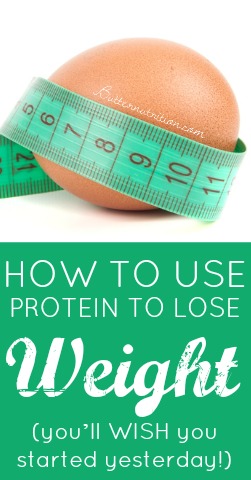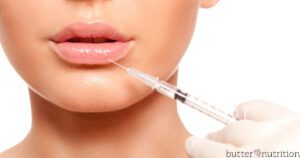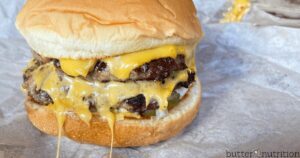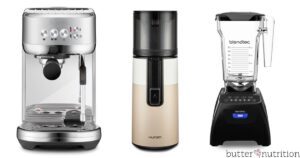
It's pretty easy to let your protein intake fall if you're not careful. A slip-up that can impact your waistline (and health) without the proper course correction.
"A few years ago, most of the nutritional problems that I saw were caused by physicians, by refined convenience foods, and by poverty. Recently, most of the problems seem to be caused by badly designed vegetarian diets, or by acceptance of the idea that 40 grams of protein per day is sufficient. The liver and other organs deteriorate rapidly on low-protein diets. Observe the faces of the wheat-grass promoters, the millet-eaters, and the 'anti-mucus' dieters, and other low-protein people. Do they look old for their age?" -Dr. Ray Peat, PhD
Use these 5 tips in the New Year to help shape a healthier you by eating enough (but not too much protein)!
1) Find out how much protein you really need.
Roughly 20% of daily calories should come from protein, that's about 90-125 grams for the average woman. Of course protein needs change with activity level, pregnancy, illness and other circumstances, so always check with your personal healthcare provider for specific guidelines for you.
While I'm usually not a big fan of counting grams or calories, sometimes it can be extremely helpful for a day or two to make sure you are eating ENOUGH. That way you can get used to what adequate protein intake looks and feels like.
Here's a few simple examples to get a ball-park range of how much protein you need:
For example, if you weigh:
125 pounds: 75-94 grams/daily
150 pounds: 90-113 grams/daily
175 pounds: 105-131 grams/daily
200 pounds: 120-150 grams/daily
For example, if you need about:
1800 calories/day: 67.5-90 grams/daily
2000 calories/day: 75-100 grams/daily
2200 calories/day: 82.5-110 grams/daily
2200 calories+/day: 110+ grams/daily
If you need a more specific range for your body, just remember that you need around .6 to .75 grams of protein each day per pound of body weight. Here's a little equation if you need more help: body weight x .6 (or .75) = ballpark grams of protein per day. The more active you are, the more you need.
2) Use your protein intake to shape your overall calorie intake. This helps to make sure you are EATING ENOUGH to support your weight loss goals and get enough nutrients to support your health.
So now that you've got a ballpark idea of how much protein you need, it's time to think about how you're going to meet that goal every day. If you need 90 grams per day; will you eat 3 larger meals with 30 grams at each meal or many smaller meals to meet your goal? How will you divide it up? This step is very individual and will largely depend on your lifestyle, appetite, blood sugar balance and other variables specific to you.
Also, whenever you have protein, it should be accompanied by ample carbohydrate and fat to help your body process the protein, balance blood sugar, support the metabolism, and round out your healthy diet. Eating enough protein can also help guide you to eat enough food during the day to support your weight loss and/or health goals! When it really comes down to it, your health goals are going to be a whole lot easier to reach when you're eating not only enough protein, but also enough nutrient rich calories to support every inch of your body!
So remember: weight loss's worst enemy is a diet low in nutrients (and calories), that's why you want to focus on making your body as nutritionally wealthy as possible by eating enough.
3) Increase your protein quality intake (protein powders NOT included).
This means choosing minimally processed grass fed, organic, or wild proteins whenever possible. It also means, understanding that the protein quality of animals vs. plants is very different.
According to Dr. Ray Peat, PhD, "One thing that happens in the vegetable diet, heavily based on [the] cabbage family, or beans, lentils and nuts, these proteins, in quality, rank about 15 times lower than the highest quality protein. And so even though a person might think they're eating nothing but protein rich foods, beans and nuts, their quality is so low that their liver simply can't respond to the thyroid."
And I'm sure you know how important thyroid function is to the metabolism and weight loss!
4) Increase your intake of proteins that help you eat the "whole animal," as they are pro-thyroid, pro-metabolic and help nourish the liver.
When you're thinking about protein intake, you want to think about eating a balance of proteins that mimic eating the whole animal. This means eating MORE of the proteins that are commonly left out of the standard American diet including bone broth and gelatin/collagen. Other great options are proteins where you eat the whole animal in one bite. Examples include certain kinds of fish (think sardines), shellfish, and eggs.
But why the whole animal? Your body needs a certain balance of amino acids (building blocks of protein) to support bodily functions, particularly your liver and detoxification. The balance you need is achieved when you eat "the whole animal" and ALL of its' parts. When you eat just "muscle meats" regularly, be it- chicken, pork, beef, lamb, etc., it tends to create an amino acid balance that favors inflammation, and starves your liver! Most people eating a standard American diet would greatly benefit from a more balanced protein consumption. The easiest way to achieve this is to restrict muscle meats while you increase the amount of anti-inflammatory 'whole animal' proteins in your diet.
"Although people in the northern countries aren't normally protein-starved, they do tend to get a large part of their protein from the muscle meats. In traditional cultures, all parts of the food animals were eaten--chicken feet, heads, and necks, animals' ears and eyeballs, etc.--and so the amino acid balance was favorable for maintaining a high metabolic rate and preventing stress." -Dr. Ray Peat, PhD
5) Be CONSISTENT with your protein intake (this means your overall food and nutrient intake too).
This last point is the hardest for everyone. After years of dieting, stress, and general life, it's so easy to get in the habit of putting yourself on the back burner. Once you've gotten into the habit of skipping meals, eating empty foods, or living a hectic life on the go, it's hard to get back in a groove of regular eating. However, consistency really is the secret to results. What you put in your body 3-6 times a day, 365 days per year has a HUGE impact on your body (and your waistline)! So don't let anyone tell you otherwise.
Still Not Seeing Results?
If you're already doing all this and not seeing results, it may be time to take a peek at your liver health. Getting some data on the nutrients that impact your liver function using hair tissue mineral analysis and select bloods labs (vitamin A/Retinol, copper, iron, whole blood histamine, and zinc) helps identify nutrient imbalances (deficiency and excess) that can contribute to packing on the pounds by impairing liver detoxification.
Need even MORE help navigating your metabolism?
P.S. If you want more practical tips (just like this one), you'll want to get your hands on my Align to Weight Loss Masterclass. It's designed to get your body and metabolism back on track so you can conquer your weight loss goals while avoiding restrictive dieting!
How much protein do you need per day? Please share in the comments!
PIN IT:
References:
Peat, Ray. Multiple sclerosis, protein, fats, and progesterone. 2009. Retrieved on 28 January 2015 from http://raypeat.com/articles/articles/ms.shtml
Peat, Ray. Nutrition for Women. 1993.
Photo Credit: Depositphotos.com/Strannik_Fox






Rebeca says
Does your ebook also contain how to remove or diminish cellulite. I have committed to begin today your recommendations in your articles by following the nutrition guidelines such as bone broth , gelatin, grassfed meats , shellfish , liver etc... My goal is health, melt away body fat w nutrition n exercise, hope that my accumulated cellulite during the last three years on a vegetarian diet will diminish.
One final ques: do I buy all animal bones that r grassfed or is this difficult to find. Same ques when purchasing liver. Wish me good luck on my 45 pound weighoss goal inspired by your article
Isaac says
Hi Catherine!
I've been reading a few of your articles and it's great having someone interpret Dr Peat's work!
Just wondering what your thoughts are on protein intake for bodybuilding? I've been doing upwards of 200g/day of protein and am unsure if this is necessary or causing stress on my body through 'Gluconeogenesis'? . I eat over 3000kcal/day at ~170lbs and am quite lean.
Thanks!
Richelle says
Am I understanding this correctly....a woman weighing around 105 lbs only needs about 3 oz of protein per day? Lately my daughter & I both feel we've been eating too much protein but I was worried that cutting back might give us too little. Guess we need to listen to our bodies.
If you have a minute, can you give me an idea of what a typical day of meals/one or two snacks might look like? Thank you!
Catherine says
Hi Richelle,
I'm not sure where 3 oz is coming from? Clearly not from the ranges I've provided.
These are just general ranges and do not take into account your individual needs, so it's best to work with your own practitioner on this.
Abundantly,
Catherine
Richelle says
I misunderstood the figures you gave (it sounded very low) but I DO understand that each individual will be different. It seems an egg is around 6 grams of protein & 6oz of tuna contains about 13 g. 1/4 cup of nuts is roughly 6g..... Does that sound more accurate?
I am still curious what you would consider a balanced day of eating - meals/snack. Do you have article I could reference?
Isabel says
Hi Richelle , I thought you might like to know that Catherine's book, Creating Wealth has great meal plans and snacks. I highly recommend reading it. Great info also
alanna says
Hi Catherine! Just found your blog, and am excited to read more! I am just wondering what macro percentages you recommend for carbs and fat to balance out the protein.? am coming off a chronic cycle of low carb, weight loss plateaus and exhaustion (probably thyroid dysfunction), and I'm trying to get over my fear of eating carbs again.
Ivan says
Thank you for these article i really enjoyed reading it . I really need to be more consistent with my protein intake.
Rebecca says
Nice article but i feel so guilty eating meat and dairy that veganism is the best for my state of mind. The one sentence in the article on vegetable sources of protein rendered me doomed to be unhealthy. Surely this isn't the case.
Vikki says
What about nursing moms? How much should I increase for that?
Angela says
I can only eat once a day due to chronic gut issues so I do fasted cardio then eat my correct amount of protein after my training. Is this okay instead of eating 3-6 meals a day?
Maria says
Dear Catherine,
Hi there! I like your blog and find it interesting.
I am pescetarian . I used to like eating meat but my stomach didn't agree with it. As I am getting older, certain vegetables isn't agreeing with my stomach either. I am a cheese lover- finding out I can't digest that anymore which I'm disappointed.. So, basically, how much protein can I intake ? I can eat egg whites! I just don't like the taste of yolks. Having said what I eat- doesn't mean I'm a skinny gal either lol I weigh 130 and would like to lose another 10-15 pounds. Well maybe just 10. I'm built stocky, have or had great muscles at one point, it just looks like I'm muscular. I drink Raw protein shakes but feel I need more of something. I do feel weak. What can you suggest for me?
New Slim LT says
Yes! Finally something about healthy eating.
Kim says
When you calculate your protein do you take the weight you currently are or your ideal weight? Or do you just calculate to your current weight and as you lose weight then you should decrease your protein? Although once you gain more muscle weight you possibly could stay the same weight anyway because muscle weighs more than fat. Just thinking through your article.
Raibin says
That's a great blog post. It was great knowing the role of protein weight loss. I also did the same during lean gaining. But when someone asks me to explain how it works. I wasn't able to explain in a simple and easy manner. Thanks to you, now I got an idea of the whole process.
Judith says
Hi, Catherine,
What do you do for all the iron your body absorbs from eating animal protein?
I know that drinking coffee is one way. But I wont be drinking it after every meal.
Thanks for all your very useful information,
Judith